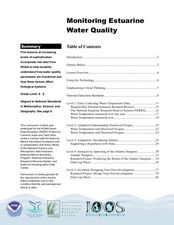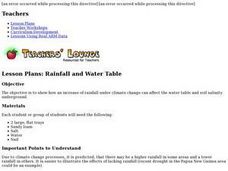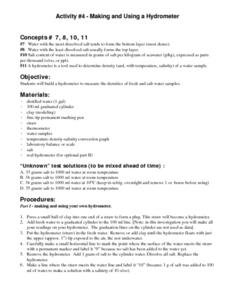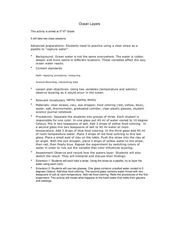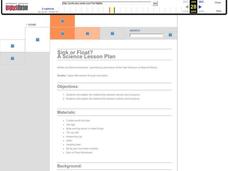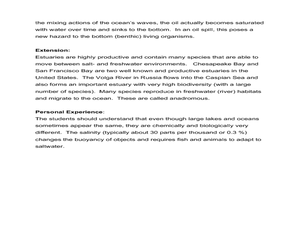Curated OER
Monitoring Estuarine Water Quality
Students analyze water quality data from real data. In this environmental science activity, students examine how salinity and dissolved oxygen affect the living organisms in the estuary. They interpret graphs to support or disprove a...
Discovery Education
Sonar & Echolocation
A well-designed, comprehensive, and attractive slide show supports direct instruction on how sonar and echolocation work. Contained within the slides are links to interactive websites and instructions for using apps on a mobile device to...
Curated OER
Marine Fisheries Management
The many aspects to consider in Marine Fisheries are covered in this very detailed PowerPoint. There are a large number of slides dealing with both the conditions to consider and terms regarding fisheries. It also covers the laws,...
Curated OER
Tracking the Salt Front
Using the Hudson River as the focus, learners discuss the difference between salt water and fresh water environments, analyze maps and graphs, and complete addition and subtraction problems. This lesson comes with a wealth of...
Curated OER
The Potential Consequences of Climate Variability and Change
Students analyze the impact of climate variability and change utilizing a broad span of topics over a wide range of grade levels. This three lesson unit is easily adapted for the various instructional levels listed.
NOAA
Oceans of Energy
Are the earth's oceans really just giant batteries, waiting for their energy to be harnessed? Middle school mechanical engineers will be shocked by the amazing amount of energy that forms around them after diving into part four of a...
NOAA
A Quest for Anomalies
Sometimes scientists learn more from unexpected findings than from routine analysis! Junior oceanographers dive deep to explore hydrothermal vent communities in the fourth lesson in a series of five. Scholars examine data and look for...
Curated OER
Marine Fisheries Management
Almost 200 slides make this a vast collection! It is a quirky collection, titled "Marine Fisheries Management," but having little to do with that occupation. What you will find are two-toned blue backgrounds with no pictures, but a few...
Scholastic
Study Jams! Earth's Oceans
Enjoy beautiful images and ocean facts together with the slide show, then see how much you absorbed by taking the quiz. Some of the topics covered in the presentation include water pressure, sunlight in the ocean, the names and locations...
Curated OER
Facts on Fish Species
Here is a brief outline of facts on various Chesapeake Bay fish species. Use it as an example of what kind of information you want your life science learners to collect when you assign them a specific species to research. Another way to...
Curated OER
The Effects of Storms
An excellent way to review a chapter or unit on storms, this worksheet features vocabulary review (gust, evacuation, storm surge, salinity), concept review (effects and details about hurricanes), skills/process review (normal high tide...
Curated OER
Rainfall and Water Table
Through inquiry, experimentation, and observation, young scientists see how an increase in rainfall under climate change can affect the water table and soil salinity underground. Young scientists build models that represent the...
Maryland Department of Natural Resources
Eyes on Dissolved Oxygen
Learn about the factors that affect the way oxygen dissolves in salt water with a chemistry lab. After studying the molecular structure of water, young scientists figure out how aeration, temperature, and organic waste affect dissolved...
Polar Trec
Is There Salt in a Glacier?
What can conductivity tell us about a glacier? Groups analyze glacial melt to determine salt content through an analysis of the pH and conductivity measurements of two samples. Groups then determine the source of the salts.
College Board
2016 AP® Biology Free-Response Questions
A remarkably high number of scholars passed the AP Biology exam in 2016 with over 61 percent earning college credit. The College Board released the entire free-response section for future scholars to study. After answering the eight...
Curated OER
Making and Using a Hydrometer
Pupils build a hydrometer to measure the densities of fresh and salt water samples. They record the water temperature and density and use the temperature, density, and salinity conversion graph to locate the salinity. Finally, students...
Curated OER
Great Salt Lake
Fourth graders make an ecosystem that brine shrimp can live in and take data as to what level of salinity the water is, how cold it is, and other data that students may think is important. They also hypothesize and predict the outcomes...
Curated OER
Ocean Layers
Students investigate how temperature and salinity causes ocean layering. In this ecology lesson, students observe and sketch their experimental result. They report their findings in class.
Curated OER
Sink or Float?
Students analyze the relationship between density, buoyancy, and salinity. In this chemical properties lesson, students read a background activity for the lesson and experiments to the topics. Students discuss the questions and complete...
Curated OER
Urban Ecosystems 2: Why are There Cities? A Historical Perspective
Second in a series of five lessons, this lesson encourages preteens to consider cities as urban ecosystems. First, they keep a food diary for a few days. They visit the Natrional Agricultural Statistics Service website for current data...
Curated OER
Understanding Salinity
Young scholars discuss why the ocean is salty. They discuss what salinity is. Students are told that is they want to know how much salt is in a body or water, they would use a special scientific tool. They complete an Estuarine Layers...
Curated OER
Salinity Of Soil
Fourth graders investigate the contents of various types of soil to determine the differences in salinity levels. They conduct an experiment of observing the plants in the different soils. Students then determine survival rates by...
Curated OER
Teacher's Guide For: Water Temperature and Salinity Experiment
Students experiment with water density, temperature and salinity. In this water lesson, students observe how the coldest water sinks to the bottom of a test tube, and how saltwater sinks in comparison to freshwater.
Curated OER
Ocean Life
Students explore the topics of ocean water salinity, ocean life zones, marine life classification, and ocean food chains. They observe demonstrations, conduct experiments, complete quizzes and handouts, and analyze key vocabulary.


